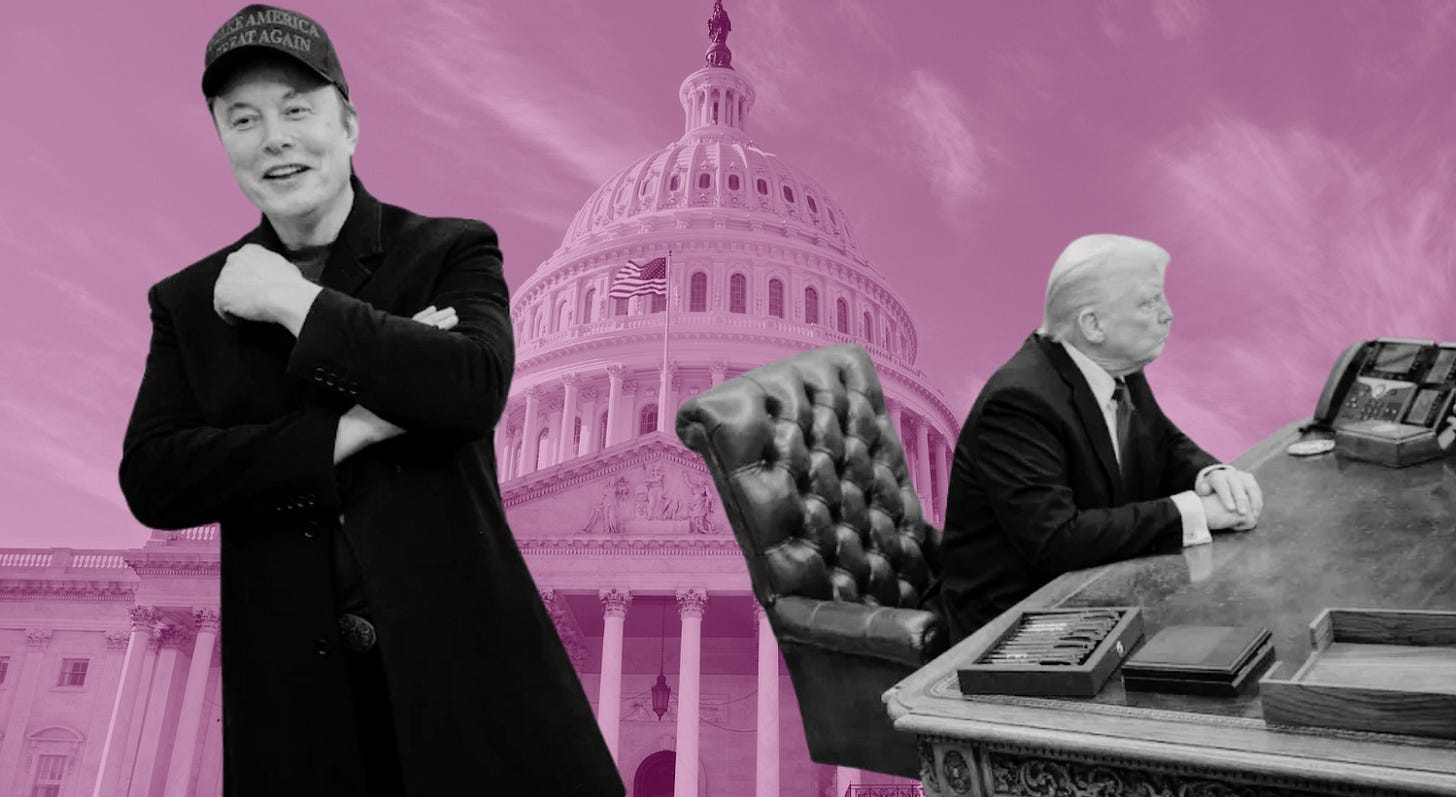If you spent any time on social media last week, you saw the operatic feud between Donald Trump and Elon Musk. You may have even watched it with unfettered glee.
It was the kind of spectacle that’s both impossible to look away from and exhausting to endure. The absurd insults, the chaotic energy, the egos … but also, the stakes. Because while the whole thing may look like a billionaire slap fight, it’s really a proxy war over what kind of power governs our lives: messy democratic institutions or the personal whims of tech oligarchs.
Elon Musk has already deleted his tweets accusing Trump of being tied to Jeffrey Epstein (water is wet). What’s left is a lot of wounded pride and a threat to start his own political party. The drama is absurd, but it’s not meaningless.
Behind the memes and late-night punchlines is a fight between two men who each want to remake the world in their image, and have the money, influence, and fanbase to try.
So, how did we get here?
Once upon a time, Trump and Musk were performing for the world a relationship of unbreakable allies. (That time was last week.) Trump practically turned the White House into a Tesla showroom, and Musk helped Trump make inroads with bros and new voters. It was a transactional bromance built on ego and ambition, so of course, it imploded.
The split wasn’t over ideology so much as optics and control. Despite their mutual disdain for regulation, Trump reportedly grew frustrated with Musk’s erratic behavior. He blocked Musk’s preferred NASA nominee. Musk’s DOGE fraud task force failed to find any real fraud and enraged Cabinet officials by stepping on toes left and right. One confrontation with Treasury Secretary Scott Bessent allegedly got physical. Musk’s Tesla stock prices were falling and investors were demanding he actually run his company.
And then came the loss in the Wisconsin election. Musk had poured money and attention into the race. Republicans lost anyway. His aura of electoral invincibility, the thing that gave him protection within MAGA world, was gone.
So Musk lashed out.
Last Tuesday, he called Trump’s signature domestic policy bill a “disgusting abomination.” Then he suggested impeachment over the bill’s price tag. (and they say women are emotional.)
Trump fired back, questioning Musk’s loyalty and mental state, and hinting that the government might retaliate against Musk’s businesses. Steve Bannon went further, calling for SpaceX to be seized. Trump floated canceling federal contracts outright.
A silent threat was heard, that Trump could re-start the many investigations into Musk’s companies.
Musk hammering on the Big Bill exposed cracks in the Republican coalition over spending. For a party that ran on fiscal restraint, the bill does the opposite, adding $2.5 trillion to the deficit and, if Trump gets his way, abolishing the debt ceiling entirely. Musk told the world that Trump has become the very swamp he promised to drain.
Why this matters
Yes, it’s tempting to dismiss the Trump–Musk fight as a reality show rerun. But when billionaires with authoritarian leanings control so much, the consequences ripple far beyond their egos.
When Musk threatened to decommission the Dragon spacecraft, which delivers cargo and crew to the International Space Station, it was a reminder that public infrastructure is now entangled with private power.
Government may not always be efficient, but it is at least accountable to more than one man’s mood swings. Musk’s behavior reveals the cost of privatizing our public institutions, not just in space travel, but across health care, transportation, and increasingly, information itself.
Because Musk isn’t just running companies. He runs X, the social platform formerly known as Twitter, which still plays an outsized role in shaping public discourse and political media. He has access to billions in wealth that, thanks to toothless campaign finance laws, can be deployed to shift elections.
And now he’s considering launching a third party. Andrew Yang told Politico that he’s reached out to Musk about it - because of course he has. It’s tempting to root for the chaos, a Musk-backed third party could split the Republican base. One should assume, however, he’d do like RFK Jr. - run as a disrupter and ultimately align with the right. But more than that, it’s important to step back and remember what Musk wants to do with that power. It not only normalizes the idea that billionaires can buy their way into politics and be enriched, it is a platform for him to keep pushing his ideas (authoritarianism, pronatalism, etc) into the mainstream discourse, electoral cycles and our government.
Some pundits are already calling this fight a “distraction,” but I don’t think that’s right. The whims of powerful men are not irrelevant when they control the levers of public life. Their fights dictate tariffs, deportations, and whether the VA gets privatized.
The Trump–Musk drama might fade from the front page, but the deeper issue remains. Who governs us and what happens when the public good is left in private hands?
ACTION:
Call your Senators and tell them you object to the Medicaid cuts in the Big spending bill. Say you want them to vote against it.
There are lots of reasons you can object to the bill (more info can be found here). The way information from calls is tallied is largely a tick yes/no in column. For/Against a bill. So the main purpose of your call is to say vote no on the bill. Cuts to Medicaid are a weak spot for Republicans, they need to find ways to pay for the tax cuts and cannot do so without cutting it.
More info on calls can be found here:








Great insight, thank you. We in PA see the flaws of the touted benefits on a Public-Private Partnership everytime we drive across the Turnpike at an astronomical cost. Things will only get worse if we allow public services to be privatized, and monopolies to emerge (looking at you, Albertsons and Kroger; Charter and Cox).
You present a really valuable perspective